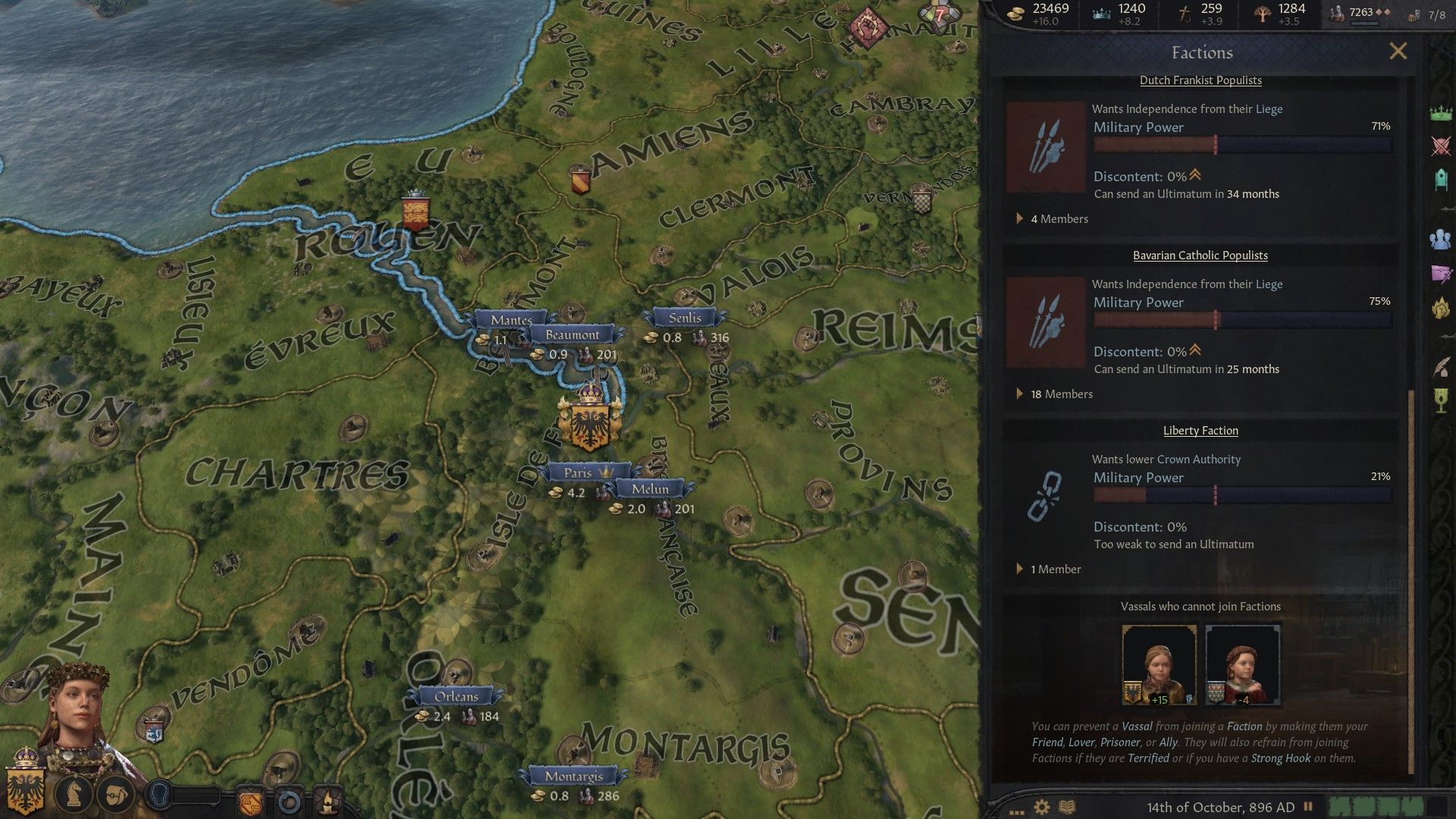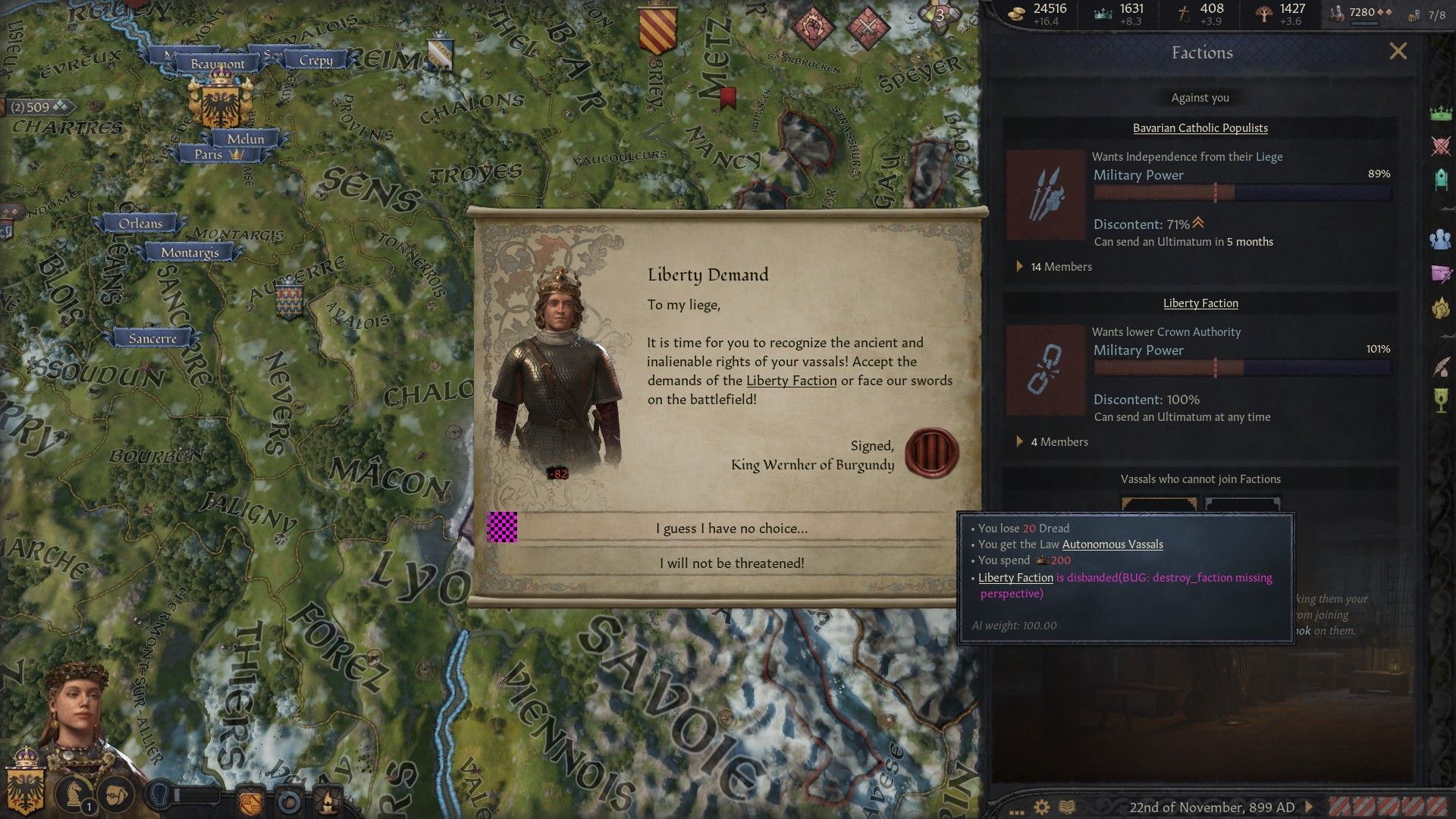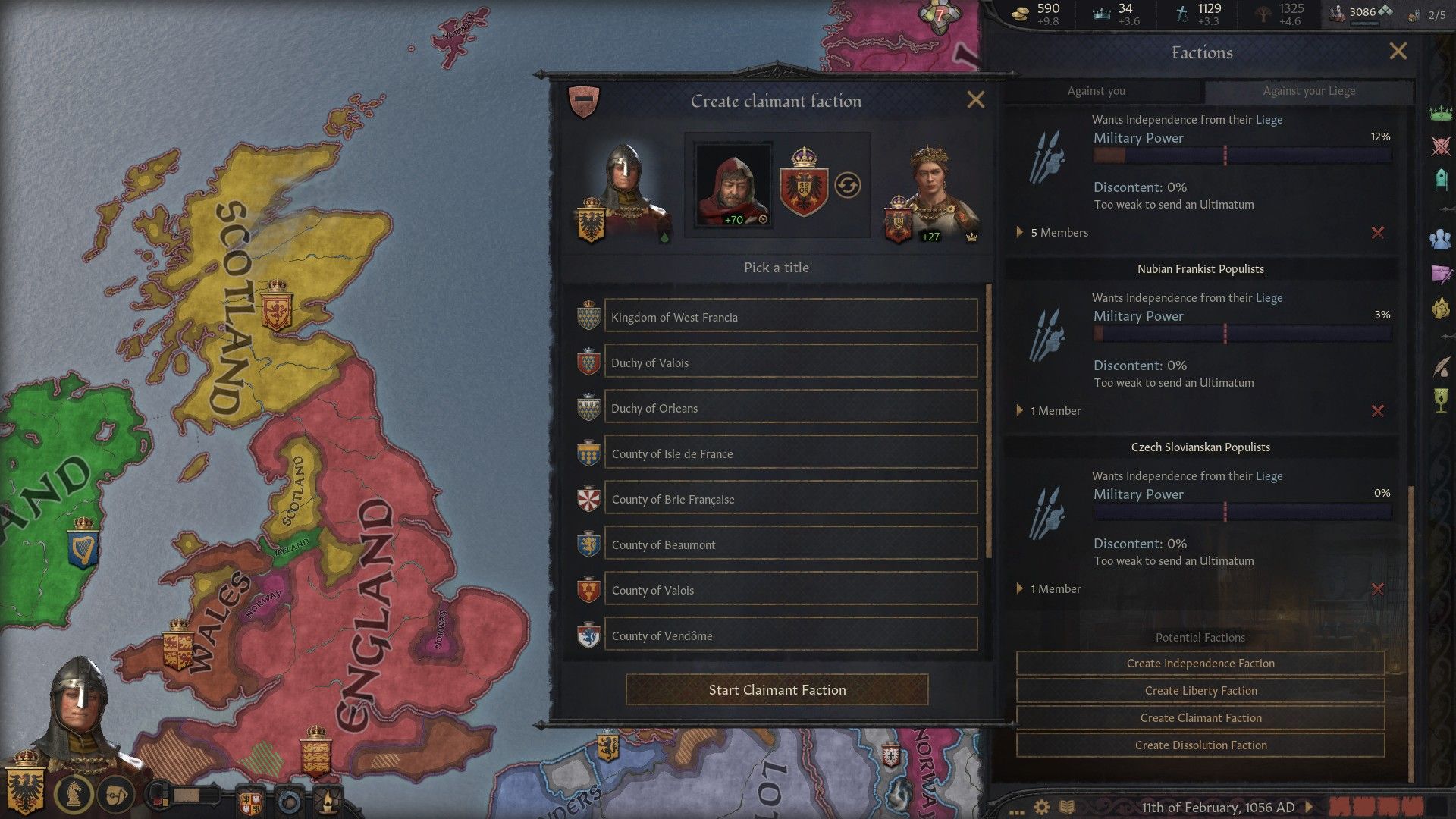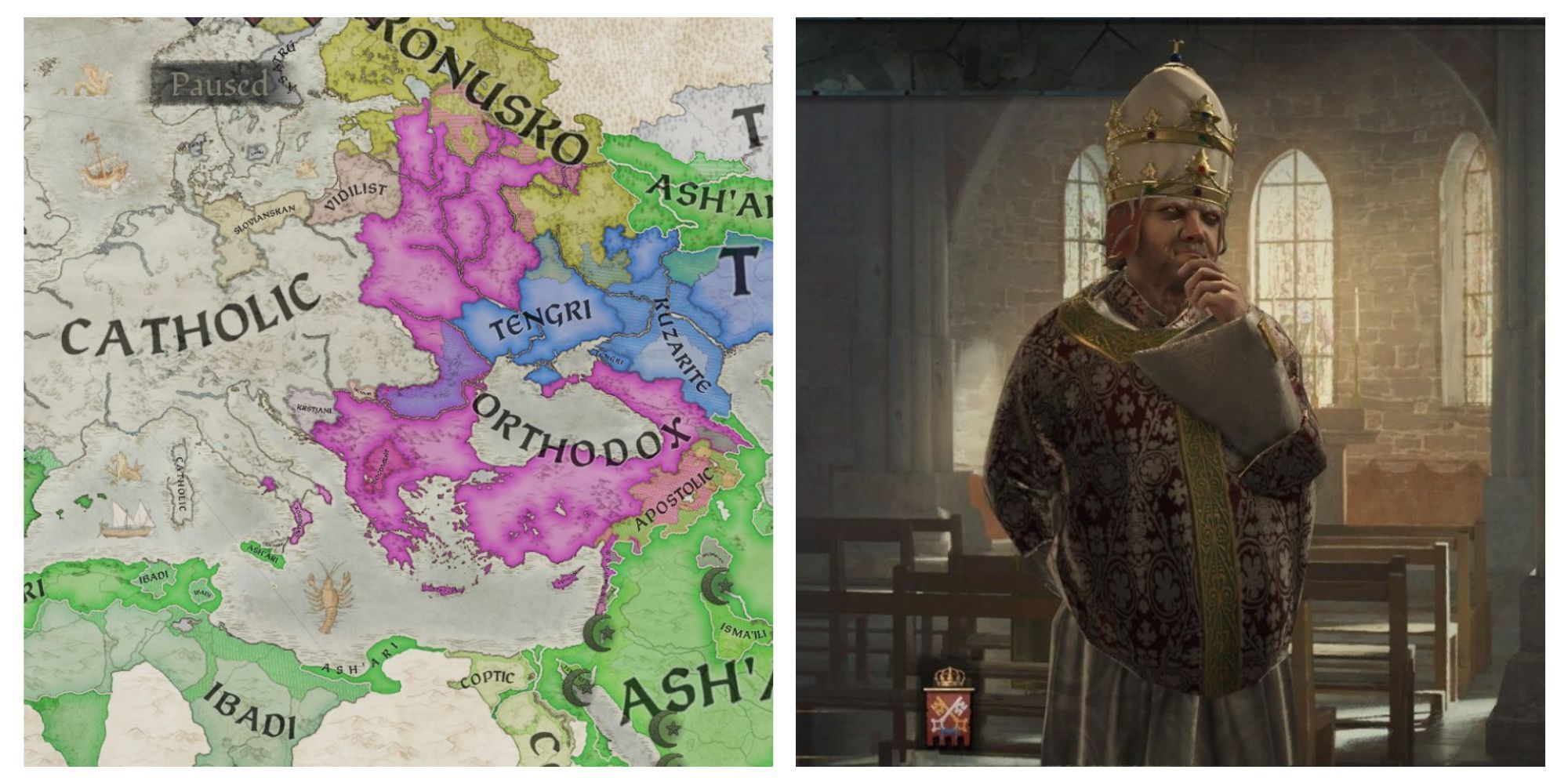
Mastering Faction Control in Crusader Kings 3

Learn how to handle internal threats in Crusader Kings 3 with our guide on factions Discover the different types of factions and when they become a threat, explore ways to prevent and minimize them through relationships with vassals, managing opinion, and the power of dread We'll also show you how to take advantage of factions to further your own goals
In medieval times, rulers had to face not only external enemies but also internal threats such as pretenders to the throne, vassals seeking independence, and religious minorities aiming to break free from foreign overlords. In Crusader Kings 3, these threats take the form of factions, persistent dangers that can even threaten stable empires. To ensure the longevity of their dynasty, players must understand the factions' goals and know how to prevent them from destroying their hard-earned empire.
Faction Types & Mechanics
To keep track of active factions, players can refer to the Faction menu on the right side of the screen, identifiable by a yellow fist on fire. Factions are categorized by type, but those with increasing discontent will be listed at the top.
- Faction Types
In Crusader Kings 3, factions are categorized based on their motives and objectives. Every motive has a unique emblem and when their Discontent level reaches 100 percent, they will present their overlord with a particular type of Ultimatum. The types of factions and their objectives are outlined below:
Type
Ultimatum
Eligibility to Join
Military Power Source
Independence
All faction members become independent rulers. Liege loses 150 Prestige.
Direct vassals
Faction member armies
Dissolution
Liege loses primary title (and 150 Prestige).
Direct vassals
Faction member armies
Claimant
The claimant backed by the faction gets the demanded title. Every faction member gets a weak hook on the claimant.
Direct vassals of the claimed title
Faction member armies
Liberty
Liege lowers Crown Authority by 1 and can't raise it again. Liege loses 200 Prestige and 20 Dread.
Direct vassals
Faction member armies
Populists
Faction members create an independent realm. Liege loses Fame level.
Direct vassals and counties with a different Faith than the ruler
Faction member armies and up to 50% of each county's levy
Peasant Rabble
Control for faction members drops by 75. Control growth is lowered by 50%, but popular opinion rises by +30.
Domain county populations
Up to 100% of each county's levy
Every faction in Crusader Kings 3 has a different level of threat to their ruler. Peasant Rabble may not pose a major threat, but their ability to increase Discontent without a minimum military power requirement makes them a nuisance. However, only rulers with personal domain counties need to worry about them. For other factions, a military power threshold must be reached before they become a real threat, usually around 75-80% of the liege's military power. Discontent increases faster when the faction is much more powerful than the liege. It's important to note that the game measures the liege's current military power, not their potential, so a poorly executed foreign war could leave them vulnerable to opportunistic factions.
- When Do Factions Become A Threat?
When a faction accumulates 100 Discontent, their leader will issue an Ultimatum to the liege. If the liege agrees, the demands will be fulfilled. However, if the liege refuses, the factions will mobilize their armies and initiate a civil war. In the event of the liege's defeat, the faction will impose their demands. It is important to note that new factions and Ultimatums can still arise even during an ongoing civil war.
How to Prevent & Minimize Factions
To prevent the formation of factions, rulers can adopt various measures, in addition to the ones listed below. It should be noted that new rulers are more susceptible to Opinion penalties and lack of Dread bonuses. Therefore, it is advisable to avoid any risky wars until the vassals have calmed down.
- Relationships With Vassals
The loyalty of the most powerful vassals is crucial in securing a place on the ruling council and maintaining military power. It's important to keep them content, even if their abilities are lacking. However, the term "powerful vassal" is relative, and having a sufficient number of vassals can deter the formation of factions against the liege. Several factors, such as age, relationships, traits, and hooks, can prevent vassals from joining factions. Vassals who hold a grudge against their liege are more likely to join a faction, while those who have a positive opinion of their liege will not join one at all. Diplomatic gifts, feasts, and grand tours are effective ways to increase vassal opinion and maintain a stable realm.
- Managing Opinion
To increase your influence, it's important to avoid any acts of tyranny. This means refraining from revoking titles, imprisoning subjects, or making feudal contracts worse. Even forcing wins during Grand Tournaments can be seen as oppressive. To avoid penalties, players can instead use claims on titles, hooks, or crimes that warrant severe punishment.
- The Power of Dread
If a liege cannot be loved, they can at least be feared. Players can instill fear by torturing and executing prominent prisoners such as foreign leaders, vassals, and even family members. The Torturer tree of the Intrigue Lifestyle offers excellent opportunities to gain additional Dread. Additionally, the Malice Implicit perk can convert high levels of Tyranny into additional Dread.
When a liege has high levels of Dread, vassals may refuse to join factions out of fear. However, this fear is only effective as long as the faction is not already increasing its Discontent. If a faction is large enough to pose a threat, even Terrified vassals may join in.
-
If engaging in warfare, it's crucial to keep in mind that capturing and imprisoning the enemy leader can lead to a quick end to the conflict. Prioritize targeting the capital and armies of faction leaders. When dealing with Populist and Peasant Rabble rebellions, remember that rebel leaders will always lead their largest army. While this tactic isn't foolproof, it's worth attempting.
How to Take Advantage of Factions
If the player ruler is a vassal rather than an independent liege, they have the option to either create their own faction or join one started by another. The Factions menu has two tabs labeled "Against You" and "Against Your Liege," with the latter only appearing if the player ruler is a vassal. At the bottom of the "Against Your Liege" tab, players can establish a new Independence, Liberty, Claimant, or Dissolution faction.
Players can only initiate one faction at a time, but they can join other factions that accept vassal members. Faction mechanics function the same way for player characters as they do for NPC rulers. However, if a player ruler leads a faction, they can send their Ultimatum at any point rather than waiting for Discontent to reach 100.
Players who are part of a faction can utilize Strong Hooks, which can compel a fellow vassal to join a faction even if they wouldn't normally do so. While Strong Hooks are rare, players can use the Truth is Relative perk in the Schemer tree of the Intrigue Lifestyle to create some short-term Strong Hooks. As a scheming vassal, players should also consider the Meritocracy perk in the Administrator tree of the Stewardship Lifestyle, which allows them to fabricate a claim to their liege's primary title and create a Claimant faction with themselves as the leader. However, players should be careful not to allow other vassals to start their own factions and take advantage of a player-led civil war. Crusader Kings 3 is available on PC, PS5, and Xbox Series X/S.
















